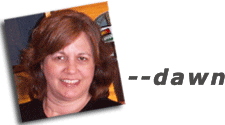mewsings, a blog

Thursday, January 26, 2006
The Data Movement

Data. Movement. Toss in some musings about differences between the sexes and that will do for today.
It's time to put a definition of data on the table, data as in data modeling and database, and even the good old term data processing.
Data: encoded propositions, a combination of form and meaning; accurate data are facts.
Accurate data are facts. Ho Hum.
Ho hum. Here's a fact: I'm in my forties. If you capture that fact as data today and then present it thirty years from now, it will be as accurate as if I were to attach a high school picture to this blog today. Alas, data changes. It can also be disseminated. Data with movement—now that's much more interesting to me.
I started in data processing with a summer job during college in 1977. I had pounded the pavement for a job. If I had not gotten this job at the last minute, I would have started as a waitress the following Monday. I had memorized the menu already, but was petrified, knowing I was not really waitress material. But I also knew I didn't want to return to being a nurse's aide in a nursing home ('73-'75) or a maid in a Holiday Inn (Maid of the Month, July 1976).
My qualifications for this job programming COBOL on a Pr1me 300 were that I had taken the equivalent of one semester course in COBOL, BASIC, and Fortran (two half courses, to be more precise). The person hiring me said the other qualification I had was that I was majoring in Mathematics and to him that meant that I was smart.
While it is impossible to know what would have happened under different circumstances, I am as sure as I can be that I would not major in Computer Science were I to enter college today. Without such a major now, it is unlikely to end up in a software development career these days. There can think of no reason why I would have chosen to major in a machine. I have even avoided joining ACM until last year when I wanted to download more papers than would make sense on a pay-per basis. I didn't like Machinery in the name. I have no interest in machinery, much less an association for such machinery.
What is the percentage of women in the car industry compared to the travel industry? What is the percentage of women in computer science compared to those who were once in that now-called-something-else profession of data processing? Some think the decline is a failure of the women's movement or, perhaps, of women. But I see it as a success with the women's movement in that girls know they have options and a failure of our discipline to appeal to these girls as it once appealed to the girl I was when it captured me.
- The percentage of women receiving bachelor-level degrees in computer or information sciences has declined from a peak of 35.8 percent in 1984 to 26 percent today.
- Among the science and engineering workforce, computer science is the only area where women's participation has declined since 1993.
I'm not interested in bases of data. I'm interested in uses of data.
I like movement and connections. To me, data processing is like travel, like movement. Databases are more like computers and cars. I'm not interested in bases of data. I'm interested in uses of data, in data movement. I went on for a master's degree in pure mathematics, not applied mathematics or science. So there is little appealing to me about a discipline called Computer Science. I'm drawn to it about as much as to the term Database Management System.
That is the great distinction between the sexes. Men see objects, women see the relationships between objects. (John Fowles)
Of course this is a generalization. I do like language and data. But I would say that I like the relationship of language and data within systems that include people. I like connections, change, impact, and movement. Am I really about to blame some part of the decrease in women in computing on the change from a focus on data processing and terms implying movement to a focus on computer science and nouns of data, DBMS, tables, domains, constraints, and objects? Yup. (Do you like how I also just tossed the OO folks into the same bucket as the RM folks?)
Thinking in terms of static data, without concurrently addressing changes to the shape, content, and distribution of that data, the use of and interactions with the data, the movement of data, is simply not compelling. These encoded propositions exist in fluid, changing systems, not as data in a vacuum.
Put the processing back with the data, please
If you take a girl today similar to the girl pictured here, with similar interests and aptitudes, my hypothesis is that she will not end up in computer science. That's what happens when you define a discipline in terms that suggest no movement and couple it with the women's movement. Girls have choices. They rarely choose to focus on objects or data. Let's tap into the data movement and put the processing back with the data, please.



